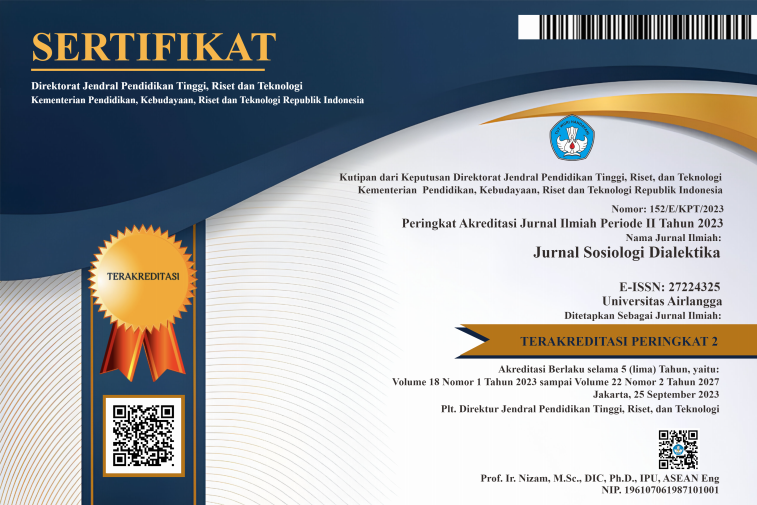Transition of extractive industry governance: Effort towards an inclusive green economy
Downloads
The transition of extractive industry governance is one of the major challenges in realizing an inclusive green economy, especially in regions with a high dependency on this sector, such as Bojonegoro Regency. This study aims to analyze the efforts of Bojonegoro in transitioning the governance of extractive industries towards the implementation of an inclusive green economy, considering the dimensions of environmental sustainability, community participation, and economic growth. The research adopts a qualitative approach, with primary data analysis through in-depth interviews and secondary data from policy documents, official reports, and related literature. The findings indicate that the Bojonegoro local government has initiated various programs to improve the sustainability of the industry, such as economic diversification, capacity building for local communities, and strengthening environmental regulations. However, significant challenges remain, including fiscal dependence on revenues from the oil and gas sector and resistance from certain stakeholders. The study concludes that the success of the transition towards an inclusive green economy requires a more holistic policy integration, collaboration among stakeholders, and strengthening the role of local communities in decision-making. Recommendations include the formulation of long-term policies for local economic diversification, the development of renewable energy, and enhanced oversight of the environmental impacts of extractive activities. These findings are expected to serve as a reference for local governments and other stakeholders in developing sustainable and inclusive transition strategies.
Ademos (2023) Dukung Bojonegoro menjadi lumbung pangan, PEPC dan Ademos gelar sinau bareng pertanian. Ademos Indonesia, 23 October. [Accessed 15 December 2024]. https://ademosindonesia.or.id/dukung-bojonegoro-menjadi-lumbung-pangan-pepc-dan-ademos-gelar-sinau-bareng-pertanian/.
Andrews N & Oppong N (2023) How global norms matter: Norm diffusion and the tangled web of localization in Ghana’s extractive industry. Globalizations 20 (3):482-498. https://doi.org/10.1080/14747731.2022.2069916.
Arafah W, Nugroho L, Takaya R, & Soekapdjo S (2018) Marketing strategy for renewable energy development in Indonesia context today. International Journal of Energy Economics and Policy 8 (5):181-186.
Ashamole DC (2019) Extractive industry and the politics of manhood in Nigeria’s Niger Delta: A masculinity perspective of gender implication of resource extractivism. NORMA 14 (4):255-270. https://doi.org/10.1080/18902138.2019.1663988.
Awuah MA (2019) Raw materials diplomacy and extractives governance: The influence of the EU on the African extractive industry space. South African Journal of International Affairs 26 (2):251-275. https://doi.org/10.1080/10220461.2019.1608852.
Badan Pusat Statistik Kabupaten Bojonegoro (2023) Pertumbuhan ekonomi Kabupaten Bojonegoro Tahun 2022. 01: 1-11.
Bank W (2012) The Pathway to Sustainable Resource. United States: New Solutions.
Biau C (2011) The ‘Governance Gap’, or missing links in transnational chains of accountability for extractive industry investment. Journal of Sustainable Finance & Investment 1 (3-4):251-260. https://doi.org/10.1080/20430795.2012.655893.
Biehl J, Missbach L, Riedel F, Stemmle R, Jüchter J, Weber J, Kucknat J, Odenweller A, Nauck C, Lukassen LJ, Zech M, & Grimm M (2023) Wicked facets of the German energy transition – examples from the electricity, heating, transport, and industry sectors. International Journal of Sustainable Energy 42 (1):1128-1181. https://doi.org/10.1080/14786451.2023.2244602.
Bünte M (2018) Building governance from Scratch: Myanmar and the extractive industry transparency initiative. Journal of Contemporary Asia 48 (2):230-251. https://doi.org/10.1080/00472336.2017.1416153.
Chu Z, Li X, & Yang J (2024) Regional industrial synergy and industry chain stability as state spatial strategies: reimagining China’s city-region governance. Territory, Politics, Governance 1-22. https://doi.org/10.1080/21622671.2024.2436999.
Creswell J (1991) Research design qualitative, quantitative, and mixed methods approaches. In: Se. Connelly (ed), Muqarnas Online (3rd ed, vol 8). California: SAGE Publications. https://doi.org/10.1163/22118993-90000268.
Cusato E (2021) Transnational law and the politics of conflict minerals regulation: construing the extractive industry as a ‘partner’ for peace. Transnational Legal Theory 12 (2):269-293. https://doi.org/10.1080/20414005.2021.1967683.
Erison Y, Sholikin A, Surur M, & Mabruri MA (2023) Leadership and Smart Environment Policy. Studi kasus implementasi Smart Environment di Pekanbaru. Madani Jurnal Politik dan Sosial Kemasyarakatan 15 (03):521-535. https://doi.org/10.52166/madani.v15i03.6270.
Erison Y (2023) Agile governance: De-eskalasi Kemiskinan berbasis Birokrasi Cergas melalui Gerakan Bela-Beli di Kabupaten Kulon Progo D. I. Yogyakarta. Salus Cultura Jurnal Pembangunan Manusia dan Kebudayaan 3 (2):135-146.
Faruque AA (2006) Transparency in extractive revenues in developing countries and economies in transition: A review of emerging best practices. Journal of Energy & Natural Resources Law 24 (1):66-103. https://doi.org/10.1080/02646811.2006.11433426.
Geels FW (2011) The multi-level perspective on sustainability transitions: Responses to seven criticisms. Environmental Innovation and Societal Transitions 1 (1):24-40. https://doi.org/10.1016/j.eist.2011.02.002.
Graham N (2020) Fossil knowledge networks: Science, ecology, and the “greening” of carbon extractive development. Studies in Political Economy/Recherches En Économie Politique 101 (2):93-113. https://doi.org/10.1080/07078552.2020.1802831.
Hilson G & Maconachie R (2008) “Good governance” and the extractive industries in Sub-Saharan Africa. Mineral Processing and Extractive Metallurgy Review 30 (1):52-100. https://doi.org/10.1080/08827500802045511.
Hinderer S & Kuckertz A (2024) Degrowth attitudes among entrepreneurs hinder fast venture scaling. Business Strategy and the Environment 33 (6):4990-5005. https://doi.org/10.1002/bse.3735.
Jatim Newsroom (2023a) Jumlah angkatan kerja Jatim di Agustus 2023 bertambah 999,75 ribu orang. Dinas Kominfo Provinsi Jawa Timur, 6 November. [Accessed 15 December 2024]. https://kominfo.jatimprov.go.id/berita/jumlah-angkatan-kerja-jatim-di-agustus-2023-bertambah-99975-ribu-orang.
Jatim Newsroom (2023b) Triwulan III-2023, industri pengolahan di Jatim tumbuh lebih tinggi. Dinas Kominfo Provinsi Jawa Timur, 9 November. [Accessed 15 December 2024]. https://kominfo.jatimprov.go.id/berita/triwulan-iii-2023-industri-pengolahan-di-jatim-tumbuh-lebih-tinggi.
Jensen JS, Fratini CF, & Cashmore MA (2016) Socio-technical systems as place-specific matters of concern: The role of urban governance in the transition of the wastewater system in Denmark. Journal of Environmental Policy & Planning 18 (2):234-252. https://doi.org/10.1080/1523908X.2015.1074062.
Jonegoroan (2013) Sejarah industri minyak di Bojonegoro. Jonegoroan, 26 May. [Accessed 15 December 2024]. https://www.jonegoroan.com/sejarah-industri-minyak-di-bojonegoro/.
Kasih N (2024) Pushep lakukan kajian di desa ring satu migas Bojonegoro: Mengidentifikasi masalah hukum dan sosial. Indonesia Legal Network, 23 July. [Accessed 15 January 2025]. https://www.indonesialegalnetwork.co.id/pushep-lakukan-kajian-di-desa-ring-satu-migas-bojonegoro-mengidentifikasi-masalah-hukum-dan-sosial/.
Kucera D & Principi M (2017) Rights, governance, and foreign direct investment: An industry-level assessment. International Review of Applied Economics 31 (4):468-494. https://doi.org/10.1080/02692171.2016.1263606.
Makinde O & Le Billon P (2023) Artificial intelligence and the extractive industries transparency initiative as anti-corruption tools for Canadian extractive companies. Journal of Energy & Natural Resources Law 41 (1):27-48. https://doi.org/10.1080/02646811.2022.2087340.
Nugroho E, Ihle R, Heijman W, & Oosting SJ (2024) The role of forest user group membership in the extraction of teak forest resources for smallholder cattle farming. Land Use Policy 139: 107053.
OECD (2013) Towards green growth. In: OECD Environmental Performance Reviews: Austria 2013, OECD Environmental Performance Reviews. Paris: OECD Publishing. https://doi.org/10.1787/9789264202924-en.
Paarlberg-Kvam K (2021) Open-pit peace: The power of extractive industries in post-conflict transitions. Peacebuilding 9 (3):289-310. https://doi.org/10.1080/21647259.2021.1897218.
Pel B (2024) Is ‘digital transition’ a syntax error? Purpose, emergence and directionality in a contemporary governance discourse. Journal of Responsible Innovation 11 (1):2390707. https://doi.org/10.1080/23299460.2024.2390707.
Poncian J & Kigodi HM (2018) Transparency initiatives and Tanzania’s extractive industry governance. Development Studies Research 5 (1):106-121. https://doi.org/10.1080/21665095.2018.1486219.
Pratama HO (2019) Peran sektor industri migas dalam penyerapan tenaga kerja lokal di Kabupaten Bojonegoro. Jurnal Ilmiah Manajemen Publik Dan Kebijakan Sosial 3 (1):341. https://doi.org/10.25139/jmnegara.v3i1.1902.
Prijosusilo B (2012) Mendayai masa depan: Rencana Indonesia untuk kekayaan minyaknya yang baru. Revenew Watch Institute.
Sholikin A (2018) Otonomi daerah dan pengelolaan sumber daya alam (minyak bumi) di Kabupaten Bojonegoro. Jurnal Ilmu Administrasi: Media Pengembangan Ilmu dan Praktek Administrasi 15 (1):35-50. https://doi.org/10.31113/jia.v15i1.131.
Sholikin A (2019) Keluar dari kutukan sumber daya alam: Studi kebijakan tata kelola industri ekstraktif di Kab. Bojonegoro. Konferensi Nasional Ilmu Administrasi 1-6.
Sholikin A & Sena N (2024) Implementasi prinsip transparansi dan akuntabilitas pada tata kelola industri ekstraktif di Kabupaten Bojonegoro. Konferensi Nasional Ilmu Administrasi 8.0. Politeknik STIA LAN Bandung. 258-266.
Southcott C & Natcher D (2018) Extractive industries and indigenous subsistence economies: A complex and unresolved relationship. Canadian Journal of Development Studies/Revue Canadienne d’études Du Développement 39 (1):137-154. https://doi.org/10.1080/02255189.2017.1400955.
Stark A, Gale F, & Murphy-Gregory H (2023) Just transitions’ meanings: A systematic review. Society & Natural Resources 36 (10):1277-1297. https://doi.org/10.1080/08941920.2023.2207166.
Suara Desa (2023) Bojonegoro optimalkan potensi pertanian dan industri. Suara Desa, 22 December. [Accessed 15 December 2024]. https://suaradesa.co/ekonomi/bojonegoro-optimalkan-potensi-pertanian-dan-industri/.
Super Updt (2023) Pengelolaan sampah berbasis sumber di Bali, antara harapan dan realita. Update Bali, 26 March. [Accessed 15 December 2024]. https://updatebali.com/pengelolaan-sampah-berbasis-sumber-di-bali-antara-harapan-dan-realita/.
Suratin A, Utomo SW, Martono DN, & Mizuno K (2023) Indonesia’s renewable natural resource management in the low-carbon transition: A conundrum in changing trajectories. Sustainability 15 (14):10997. https://doi.org/10.3390/su151410997.
Tr CAH (2014) Pengakuan hak konstitusional pengelolaan sumber daya industri ekstraktif dalam mewujudkan kesejahteraan rakyat. Jurnal Konstitusi 11 (1):43-63. https://doi.org/10.31078/jk1113.
Veltmeyer H (2013) The political economy of natural resource extraction: A new model or extractive imperialism? Canadian Journal of Development Studies/Revue Canadienne d’études Du Développement 34 (1):79-95. https://doi.org/10.1080/02255189.2013.764850.
Voorberg WH, Bekkers VJJM, & Tummers LG (2015) A systematic review of co-creation and co production: Embarking on the social innovation journey. Public Management Review 17 (9):1333-1357. https://doi.org/10.1080/14719037.2014.930505.
Yuan J, Al Shraah A, Kuo Y-K, Muda I, Mabrouk F, Espinoza-Maguiña M, & Abdulrehman N (2023) Effects of ecological innovation, governance structure, and social development on the adoption of sustainable reporting in the global tourism industry. Economic Research-Ekonomska Istraživanja 36 (2):2179092. https://doi.org/10.1080/1331677X.2023.2179092.

This work is licensed under a Creative Commons Attribution-NonCommercial-ShareAlike 4.0 International License.
1. Copyright of this journal is possession of Editorial Board and Journal Manager, by the knowledge of author, whilst the moral right of the publication belongs to the author.
2. Legal formal aspect of journal publication accessibility refers to Creative Commons Attribution-NonCommercial-ShareAlike (CC BY-NC-SA), implies that publication can be used for non-commercial purposes in its original form (cannot be modified).
3. Every publications (printed/electronic) are open access for educational purposes, research, and library. Other that the aims mentioned above, editorial board is not responsible for copyright violation.















